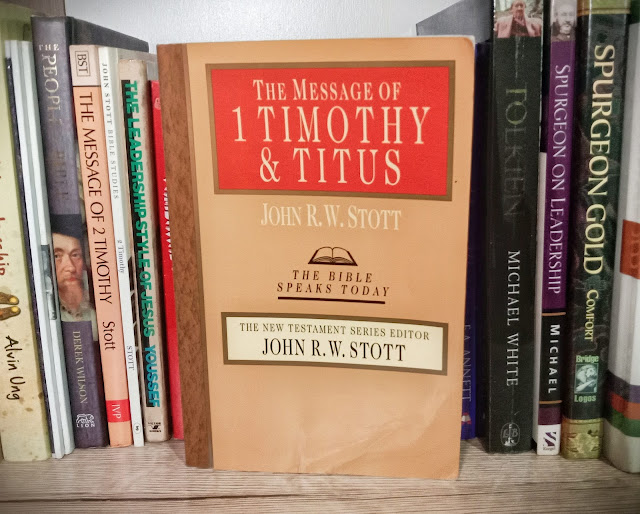 |
| The Lord from Heaven: A Study of the New Testament Teaching on the Deity and Humanity of Jesus Christ (1958, 1974) by Leon Morris |
This is a very worn-out book. But it is very good, insightful, and surprisingly still relevant amidst the many books on the same topic. I’ve read it during my flight to Cambodia a few years ago. Due to the holiday mood, I forget most of the contents (this is good because I can read it all over again as if it's new for me) but I remember thinking that I must read it again slowly and thoughtfully. I’m glad I did. Because over the years as I’m gaining more knowledge of the Scripture, interest in theology, and passion for the Person of Jesus Christ, I can appreciate it even more now. What I like about Leon Lamb Morris (1914-2006), a respected New Testament scholar, is that he writes in such a way that is both scholarly and yet readable, with depth and yet simple, just like the late John Stott and Michael Green. I highly recommend his Bible commentaries too especially on the Gospel of Matthew, John, and Romans.
Why this book is important? Simply this: Jesus Christ is. His question to the disciples, “Who do you say I am?” (Matthew 16:15) is what we - the believers and the potential believers - must discover over and over again for the rest of our lives. Knowing Jesus is not enough. Knowing the right Jesus as taught in the Scripture is essential. Knowledge of truth leads to saving faith, faith leads to eternal life. Our theology affects our doxology. What do we say and believe about Jesus matters! The main purpose of Leon Morris in this book is to give a short and simple outline of what the New Testament says about the Person of Jesus. He concludes that the Scripture taught clearly that He is BOTH God AND man. I agree. Morris writes, “The great thought of the New Testament is that God has taken action in the Person of His Son to put away man’s sin. This is not the idea of one or two writers, but the whole of the early church. Nowhere in the New Testament do we find any such thought as that Jesus is like one of the angels, or that He can be fully explained in purely human terms. With one accord the New Testament writers insist that Jesus must be thought of as God in the fullest sense. His relationship to the Father is the very closest relationship possible. There is no doubt about the place they ascribe to Jesus.”
He continues, “This is all the more remarkable in view of their convinced monotheism. They do not seem to have envisaged the possibility of a multiplicity of gods. They took it as an axiom that there can be only one God. Without compromise on this basic tenet, they yet affirmed the deity of Christ.” Right. When someone asks me to explain about the Doctrine of the Trinity, how can one God exist in three Persons, I usually added one more challenging issue to the inquiry by stating the Doctrine of the Incarnation, that God became human, and He - Jesus - was truly God and truly man. How can it be? Well, I can help him or her to examine the Scripture but I can never explain it fully. “How these two, the deity and the humanity, are related, or even how they could come to co-exist in the one Person, we do not know,” said Morris honestly. “The evidence does not indicate that Jesus was partly God and partly man, that He did some things as God and others as a man. Rather He was one Person, though a Person with divine and human characteristics.” This is a mystery beyond any man’s power to solve or to explain it away. I think we are free to reject this doctrine if we also reject the consistent testimonies of the Scripture, particularly the New Testament, regarding the Person of Jesus. But if we accept the Scripture as the written Word of God (I do), there is no way for us to deny that Jesus was God incarnate. As H.E.W. Turner, quoted by Morris, emphasizes strongly, “The Person of Jesus does not come apart in our hands into the two halves of humanity and divinity, one of which we have to set on one side when we begin to examine the other. His Personality is a seamless whole.”
This book is divided into eight (8) chapters, namely, 1) Jesus of Nazareth; 2) Jesus’ View of Himself; 3) Jesus the Man; 4) A Prince and A Saviour; 5) The Lord of Glory; 6) A Great High Priest; 7) God the Word; and 8) Conclusion. In each chapter, Morris unpacked what the New Testament taught about the humanity and divinity of Jesus from multiple angles, genres, and themes but leave the verdict for us to answer ourselves: “Who do you say about Jesus?”
#ServeToLead #LeadersAreReaders #TheLordFromHeaven #LeonMorris #LetsMakeReadingCoolAgain
Related book review: The Forgotten Trinity (1998) by James R. White, CLICK HERE
To read my other #1Book1Week book reviews, CLICK HERE
FB Page: https://facebook.com/LEGASI.tv/
Podcast: http://bit.ly/LegasiSpotify
YouTube: https://www.youtube.com/c/LEGASItv/
THINK BIG. START SMALL. GO DEEP.


















